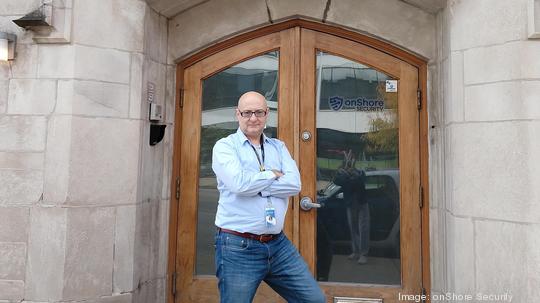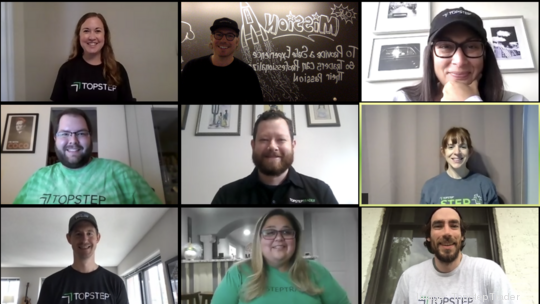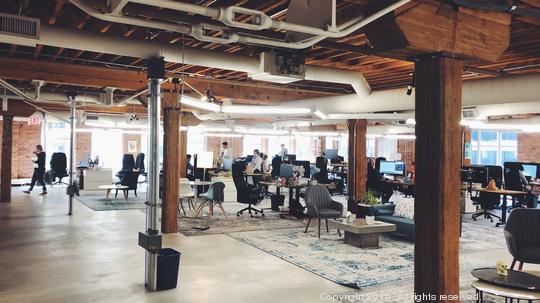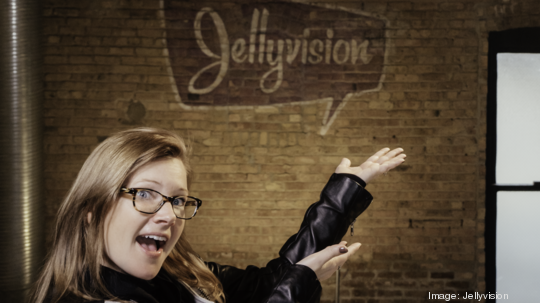After working out of a West Town office for more than 20 years, Stel Valavanis, founder and CEO of onShore Security, is ready to part ways with it.
onShore’s staff of 30 has become accustomed to remote work since the onset of the pandemic in March. And now eight months later, Valavanis is realizing that a physical office isn’t quite as essential to the company’s success as he once thought.
During the middle of a pandemic and economic downturn, Valavanis is trying to sell the company’s office, a converted 120-year-old funeral home at 1407 W. Chicago Ave., as onShore moves to a completely and indefinite remote work model.
Originally founded as a security company in 1991, onShore has morphed into a cybersecurity software business that mainly sells its services to enterprise banking clients. Like most companies before the pandemic, having employees in the office every day was a priority. In fact, onShore employees were actually discouraged to work from home unless there were extenuating circumstances.
“We actually gave people bonuses to be in the office,” Valavanis said. “I thought there was innovation to be had, and culture and comradery. But I was wrong about it. I was just flat out wrong. I can’t emphasize how much I personally had an epiphany.”

Over the last several months, Valavanis said operations at onShore have largely been business as usual despite every employee working remotely, and the company isn’t alone in realizing that a physical office space is less crucial than it was once thought to be.
onShore is just one of several Chicago companies that plan to embrace full or partial remote work models once the Covid-19 pandemic is under control. Office vacancy in Chicago's central business district rose to 15.4%, the highest rate in nine years, according to data reported in October from real estate services firm CBRE. And vacancy is expected to rise as the pandemic endures and office patterns continue to change.
Local tech companies from Cameo to Jellyvision, and Popular Pays to Relativity are approaching office work differently. And taking work flexibility one step further, some companies are experimenting with shortening the workweek, with one company offering four-day weeks.
TopstepTrader, a fintech company for simulated stock trading that employs about 60 people, began giving its employees the option to work a four-day workweek, something often talked about in future of work circles, but rarely executed in the workplace. Working Monday through Thursday for 10 hours each day, Topstep employees still work a 40-hour week but can enjoy the luxury of three-day weekends, and their pay and benefits remain the same.
Topstep CEO Jay Rudman began offering the unusual perk in July as a way to help support employees who were feeling run down by the stress that 2020 has brought with it—whether it be surrounding the pandemic, work or politics.
“The wellbeing of the team was suffering,” Rudman said. “We heard a lot during the Covid-19 pandemic that people were burning out … and we had to do something.”

About 75% of Topstep’s workforce is taking advantage of the new policy and Rudman said company data shows that employees are just as productive working four days a week as five. Eighty eight percent of employees reported feeling more productive and 92% reported an improved work-life balance.
“The data has been exceptionally positive,” Rudman said. “We did not see any slippage in our productivity numbers. We don’t foresee a reason to move away from [four-day workweeks].”
Once the pandemic is under control, Rudman said Topstep will never require employees to go back to the office full-time ever again. Similar to his local tech peers, Rudman realized remote work can be successful.
“As long as you have good internet access and can fulfill your accountabilities, that’s fine by us,” Rudman said.
This sentiment is shared by other Chicago tech companies, such as Cameo and Popular Pays, two companies that have enjoyed remote work so much that they ditched their physical office space completely.
“Even if there’s a Covid cure tomorrow, we’re going to stay a distributed company, hiring the best people in Chicago and everywhere else in the world,” said Steven Galanis, the CEO of Cameo, a marketplace for celebrity shoutout videos.

In March, Cameo had been planning to move into a new, larger office in Fulton Market. The company was set to sign a 10-year lease for the new office, but Galanis pulled out of the deal at the last minute and only one day after Cameo asked employees to work from home because of the pandemic.
“I ended up just having this Spidey sense that it was a bad idea,” Galanis said.
Now, Cameo is “homeless,” operating completely remote with no office space. And with the money it saved on rent, Cameo gave every employee a bonus, Galanis said.
While Cameo employed more than 100 people at its Chicago offices, the company has always had somewhat of a distributed team. Galanis’ cofounders Devon Townsend and Martin Blencowe live and work in Los Angeles, and Cameo’s first employee was based in New York. Globally, Cameo has more than 150 employees.
One of the biggest perks of completely remote work is the freedom employees have to travel and in some cases, even move to new cities. Several Cameo employees have moved away from Chicago, and even Galanis has been exploring new areas. He lived in Los Angeles for a few months over the summer. He now resides in Miami, where he’s signed a year lease close to the beach.
“I love Chicago. Chicago is home for me,” Galanis said. “But it’s been pretty cool to have the opportunity and flexibility to try something else.”
Popular Pays, a Chicago startup helping brands connect with social media influencers on digital ad campaigns, also went fully remote during the pandemic, ending its Loop office lease in July, said CEO Corbett Drummey.

Drummey made the decision to forgo physical office space after seeing how well remote work was going for the company’s 40 employees. Drummey told Chicago Inno earlier this year that the startup had its best quarter ever in Q2, thanks in part to the growth of TikTok. And in September, the startup launched a specific TikTok Search tool that allows companies to browse from more than 550,000 TikTok creator profiles and discover talent that can be used to create a viral campaign.
“We’re literally at our best numbers ever, but despite doing well, it felt like we were going out of business,” he said about giving up Popular Pay’s office space. “We were packing up all these mementos and it was really sad. But we hit all of our goals and that gave us a lot of confidence that we can still operate effectively remotely."
Once the pandemic is under control, Drummey said he intends for the Popular Pays team to continue working remotely with in-person meetings every six months. Without paying office rent, the company is cutting expenses by about 15% year over year, Drummey said.
While fully remote work has perks, like being able to travel, avoid illness and cut out long commutes, some parts of one’s work life suffer, especially when it comes to joining a new company.
For many workers, learning about a new business and their role at it has much to do with the example being set by their coworkers in the office every day. But when employees are at home, isolated from the rest of their new peers, it can be hard to figure out tasks, discover the company culture and integrate into it.
“You lose the serendipitous encounters that help you find friends and get rich context, and help you hear what’s going on around the organization in ways that wouldn’t happen based on just your day-to-day work requirements,” said Jellyvision CEO Amanda Lannert.
At Jellyvision, which makes an employee communication platform, onboarding new employees has been the most challenging task during this period of remote work, Lannert said. Since the pandemic started, Jellyvision has added more than 20 people to its team of 325, including a chief operations officer that lives in Virginia, Jellyvision’s first fully remote executive.

“Training via Zoom is more fatiguing than training in person,” said Lannert, adding that video chatting, or “stare-athons,” as Lannert calls them, is the most draining part of her day. “It’s a different level of fatigue than being in meetings.”
Besides Zoom fatigue, Lannert said she misses the office and the sense of community she and other employees felt around the business.
“It’s less fun being remote. It just is,” said Lannert, who now works from the basement in her Hinsdale home. “People are losing social capital and relationships outside of their direct teams. There’s this feeling of lack of community and lack of being in the know.”
That’s why when the state of Illinois reaches stage five of Gov. J.B. Pritzker’s reopening plan, Jellyvision will welcome employees back into its Lincoln Park offices, though going forward, employees will always have the option to work from home. Even Lannert said she doesn’t plan to spend five days a week in the office ever again.
“We expect most employees will not be back in the office five days a week, but for those who want office space, we’re going have it there,” Lannert said. “There’s a very large brand promise that Jellyvision has made about a bustling environment that has drawn the people who like to work at Jellyvision. Our strategy—once we’re allowed to be open—is to be flexible first.”



